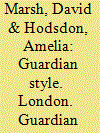| Srl | Item |
| 1 |
ID:
180018


|
|
|
|
|
| Summary/Abstract |
Farvi, also known as Farrokhi, is an Iranian language spoken in the village of Farvi in Khur district of Kavir desert in central Iran. It shares features with other languages in Kavir region such as Khuri, Irāji and Garmayi. This paper describes synchronic and historical phonology and the grammar of Farvi based on data collected in Farvi village during April 2019. The study of historical phonology and morphological evidence show that though basically Northwestern, Farvi shares some features with Southwestern Iranian languages so that, like Kurdish and Balochi, it is separated from the other Northwestern Iranian languages. In later changes, Farvi shows some areal features that put it alongside Southeastern languages such as Northern Bashgardi and Balochi.
|
|
|
|
|
|
|
|
|
|
|
|
|
|
|
|
| 2 |
ID:
103811


|
|
|
|
|
| Publication |
London, Guardian Books, 2010.
|
| Description |
378p.
|
| Standard Number |
9780852652220, hbk
|
|
|
|
|
|
|
|
|
|
|
|
Copies: C:1/I:0,R:0,Q:0
Circulation
| Accession# | Call# | Current Location | Status | Policy | Location |
| 055920 | 423.1/MAR 055920 | Main | On Shelf | General | |
|
|
|
|
| 3 |
ID:
101022


|
|
|
|
|
| Publication |
2010.
|
| Summary/Abstract |
The present and past progressive tenses in Persian are the only tenses in which both the main verb and the minor verb dacircscarontan "to have" receive agreement marking. Morpho-syntactically, Persian progressives show the similar properties of both Aspectual Complex Predicates and Serial Verb Constructions. The question that this paper addresses is: are Persian progressive tenses Aspectual Complex Predicates or Serial Verb Constructions? By presenting the morpho-syntactic and semantic analysis of Persian progressives, and highlighting the main properties of Aspectual Complex Predicates and Serial Verb Constructions, the paper shows that, despite the similarities between these verbal constructions and Aspectual Complex Predicates, Persian progressives are instances of Serial Verb Constructions where neither a complementizer nor a conjunction separates the two verbs and the complex describes a single conceptual event.
|
|
|
|
|
|
|
|
|
|
|
|
|
|
|
|